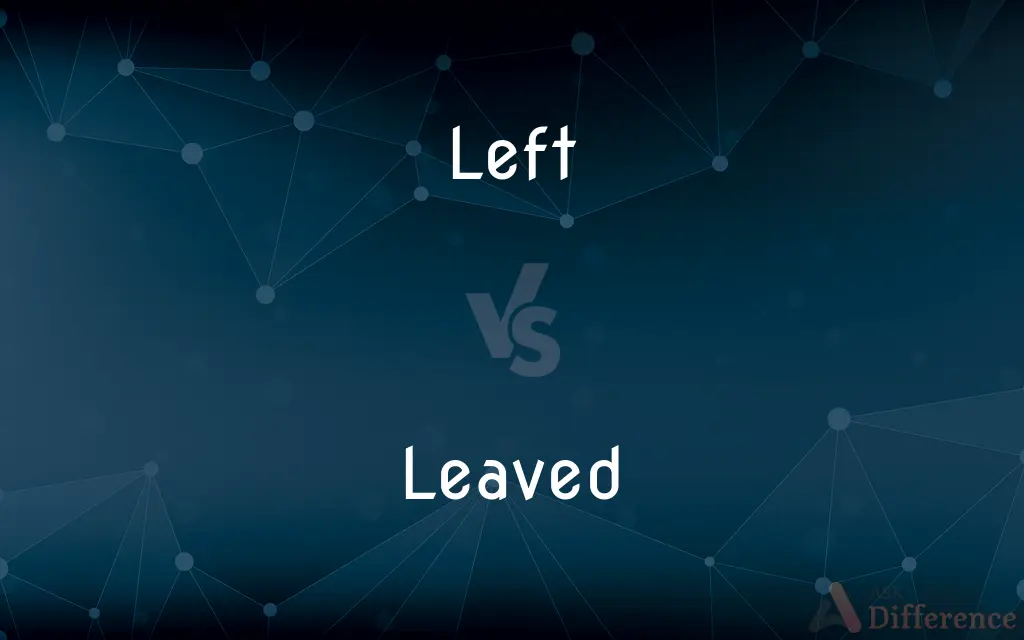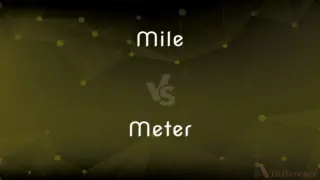Left vs. Leaved — What's the Difference?
By Fiza Rafique & Maham Liaqat — Updated on March 12, 2024
"Left" primarily refers to the past tense of leave or the directional opposite of right, while "leaved" pertains to something having leaves, often used in botanical contexts.

Difference Between Left and Leaved
Table of Contents
ADVERTISEMENT
Key Differences
"Left," as a term, can indicate departure or the act of leaving a place, as in someone having gone away, or it can denote the direction that is opposite to right, emphasizing orientation or position. On the other hand, "leaved" is an adjective that describes objects, usually plants or doors, that possess leaves or leaf-like structures, highlighting their physical characteristics.
In usage, "left" is versatile, applicable in various contexts from indicating a physical direction to describing the action of departing from a location or situation. For example, one might turn left at an intersection or have left a job. Conversely, "leaved" is more specific, often used in descriptive botanical contexts, such as in "broad-leaved" trees, which refers to trees with wide leaves.
The concept of being "left" can also extend to feelings of abandonment or items that are remaining, as in being "left behind" or "leftovers." In contrast, "leaved" is used to detail the nature of an object's appendages, not just in terms of plants but also in architectural elements like doors, as in "well-leaved" referring to a door with multiple panels.
While "left" is commonly used in everyday language, encompassing a wide range of meanings from directions to actions, "leaved" is more niche, primarily found in literature, botanical descriptions, and specific phrases. Its usage is closely tied to the presence or characteristics of leaves or leaf-like features, making it less versatile than "left."
Comparison Chart
Definition
Refers to the past tense of leave or the directional opposite of right.
Describes something that has leaves or leaf-like structures.
ADVERTISEMENT
Usage
Versatile, used in contexts of direction, departure, and remainder.
Specific, often used in botanical or descriptive contexts.
Context
Everyday language, navigation, and expressions of abandonment.
Botanical descriptions, literature, and architectural features.
Connotation
Can imply direction, departure, or remaining items.
Indicates the physical characteristic of having leaves.
Examples
"He left the room," "Turn left at the corner."
"Broad-leaved forest," "The leaved doors of the mansion."
Compare with Definitions
Left
As a direction, opposite to right.
Turn left at the next street to reach the park.
Leaved
Describes plants with a specific type of leaf.
The broad-leaved maple is known for its large leaves.
Left
Refers to remaining items or people.
Only a few pieces were left after the sale.
Leaved
Used in poetry or literature to describe scenes or objects with leaf-like features.
The leaved shadows danced on the wall.
Left
Indicates departure or abandonment.
She left the meeting early due to an emergency.
Leaved
Can refer to architectural elements with panels resembling leaves.
The intricately leaved door added elegance to the entrance.
Left
Used in political contexts to denote progressive or socialist ideologies.
The left-wing party advocates for environmental reforms.
Leaved
Sometimes used metaphorically to describe pages in a book.
He flipped through the leaved pages, searching for a quote.
Left
In sports, refers to the left-hand side or left-footed play.
He plays as a left winger in soccer.
Leaved
In botanical terms, specifies the leaf arrangement or type on a stem.
The plant is identified as compound-leaved due to its leaf structure.
Left
Of, belonging to, located on, or being the side of the body to the north when the subject is facing east.
Leaved
Having a specified number or kind of leaves. Often used in combination
Three-leaved.
Wide-leaved.
Left
Of, relating to, directed toward, or located on the left side.
Leaved
Having a leaf or leaves of a particular kind
Ivy-leaved toadflax
Left
Located on the left side of a person facing downstream
The left bank of a river.
Leaved
Having or bearing a leaf or leaves.
Left
Often Left Of or belonging to the political or intellectual left.
Leaved
Having a leaf, leaves or folds
Left
The direction or position on the left side.
Leaved
Simple past tense and past participle of leave(in the sense "to produce leaves or foliage")
Left
The left side.
Leaved
Bearing, or having, a leaf or leaves; having folds; - used in combination; as, a four-leaved clover; a two-leaved gate; long-leaved.
Left
The left hand.
Leaved
Having leaves or leaves as specified; often used in combination;
A fully leafed tree
Broad-leafed
Four-leaved clover
Left
A turn in the direction of the left hand or side.
Left
The people and groups who advocate liberal, often radical measures to effect change in the established order, especially in politics, with the goal of achieving the equality, freedom, and well-being of the common citizens of a state. Also called left wing.
Left
The opinion of those advocating such measures.
Left
(Sports) A blow delivered by a boxer's left hand.
Left
(Baseball) Left field.
Left
Toward or on the left.
Left
Past tense and past participle of leave1.
Left
Designating the side of the body toward the west when one is facing north; the opposite of right. This arrow points to the reader's left: ←
The left side.
Left
(geography) Designating the bank of a river (etc.) on one's left when facing downstream (i.e. facing forward while floating with the current); that is, the north bank of a river that flows eastward. If this arrow: ⥲ shows the direction of the current, the tilde is on the left side of the river.
Left
(politics) Left-wing; pertaining to the political left.
Left
On the left side.
Left
Towards the left side.
Turn left at the corner. NO! Your other left.
Left
Towards the political left.
The East Coast of the US leans left in elections.
Left
The left side or direction.
Left
(politics) The left-wing political parties as a group; citizens holding left-wing views as a group.
The Left left workers behind, thinking they had a winning demographic coalition. It hasn't really worked out for them yet.
Left
The left hand or fist.
Left
(boxing) A punch delivered with the left fist.
Left
(surfing) A wave breaking from left to right (viewed from the shore).
Left
Simple past tense and past participle of leave||depart, separate from; (cause or allow to) remain.
There's not much food left.
Left
Simple past tense and past participle of leave||permit.
We were not left go to the beach after school except on a weekend.
Left
Of Leave.
Left
Of or pertaining to that side of the body in man on which the muscular action of the limbs is usually weaker than on the other side; - opposed to right, when used in reference to a part of the body; as, the left hand, or arm; the left ear. Also said of the corresponding side of the lower animals.
Left
Situated so that the left side of the body is toward it; as, the left side of a deliberative meeting is that to the left of the presiding officer; the left wing of an army is that to the left of the center to one facing an enemy.
Left
That part of surrounding space toward which the left side of one's body is turned; as, the house is on the left when you face North.
Put that rose a little more to the left.
Left
Those members of a legislative assembly (as in France) who are in the opposition; the advanced republicans and extreme radicals. They have their seats at the left-hand side of the presiding officer. See Center, and Right.
Left
Location near or direction toward the left side; i.e. the side to the north when a person or object faces east;
She stood on the left
Left
Those who support varying degrees of social or political or economic change designed to promote the public welfare
Left
The hand that is on the left side of the body;
Jab with your left
Left
The piece of ground in the outfield on the catcher's left
Left
A turn to the left;
Take a left at the corner
Left
Being or located on or directed toward the side of the body to the west when facing north;
My left hand
Left center field
The left bank of a river is bank on your left side when you are facing downstream
Left
Not used up;
Leftover meatloaf
She had a little money left over so she went to a movie
Some odd dollars left
Saved the remaining sandwiches for supper
Unexpended provisions
Left
Intended for the left hand;
I rarely lose a left-hand glove
Left
Of or belonging to the political or intellectual right
Left
Toward or on the left; also used figuratively;
He looked right and left
The political party has moved left
Common Curiosities
Can "left" be used to describe political orientation?
Yes, "left" can describe a political orientation that leans towards progressive, socialist, or liberal ideologies.
What does "left" mean in a directional sense?
In a directional sense, "left" refers to the side that is opposite to right.
How does "left" relate to feelings of abandonment?
"Left" can convey feelings of abandonment when used in contexts like being "left behind" or someone "left" without notice.
What does "broad-leaved" mean?
"Broad-leaved" describes plants that have wide leaves, often used in botanical contexts.
How is "leaved" used in architecture?
In architecture, "leaved" can describe doors or panels that have multiple sections or folds, resembling leaves.
Are "left" and "leaved" interchangeable?
No, "left" and "leaved" are not interchangeable as they refer to different concepts; "left" pertains to direction, departure, or remaining, while "leaved" describes having leaves.
Does "left" have a specific meaning in sports?
In sports, "left" can refer to the left-hand side of the field or court, or to players who predominantly use their left hand or foot, like a left winger in soccer.
Is "leaved" commonly used in everyday language?
"Leaved" is less common in everyday language and is more often found in botanical descriptions or literature.
Can "left" indicate remaining items?
Yes, "left" can indicate remaining items, as in "leftovers" or what is "left behind."
What does "compound-leaved" refer to?
"Compound-leaved" refers to a type of leaf arrangement where a single leaf is divided into multiple leaflets, each connected to a central stem.
Share Your Discovery

Previous Comparison
Counselling vs. Counseling
Next Comparison
Mile vs. MeterAuthor Spotlight
Written by
Fiza RafiqueFiza Rafique is a skilled content writer at AskDifference.com, where she meticulously refines and enhances written pieces. Drawing from her vast editorial expertise, Fiza ensures clarity, accuracy, and precision in every article. Passionate about language, she continually seeks to elevate the quality of content for readers worldwide.
Co-written by
Maham Liaqat













































